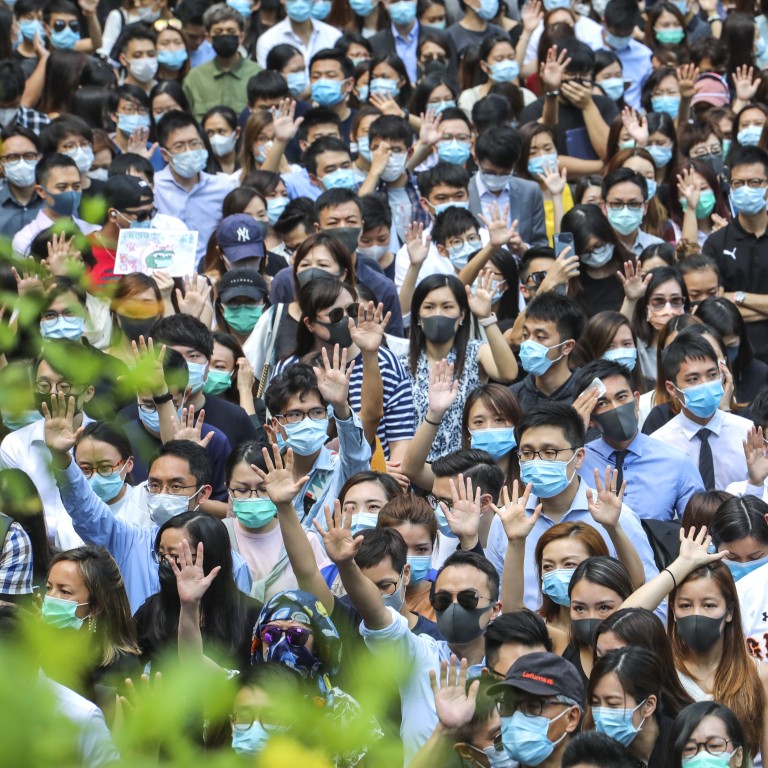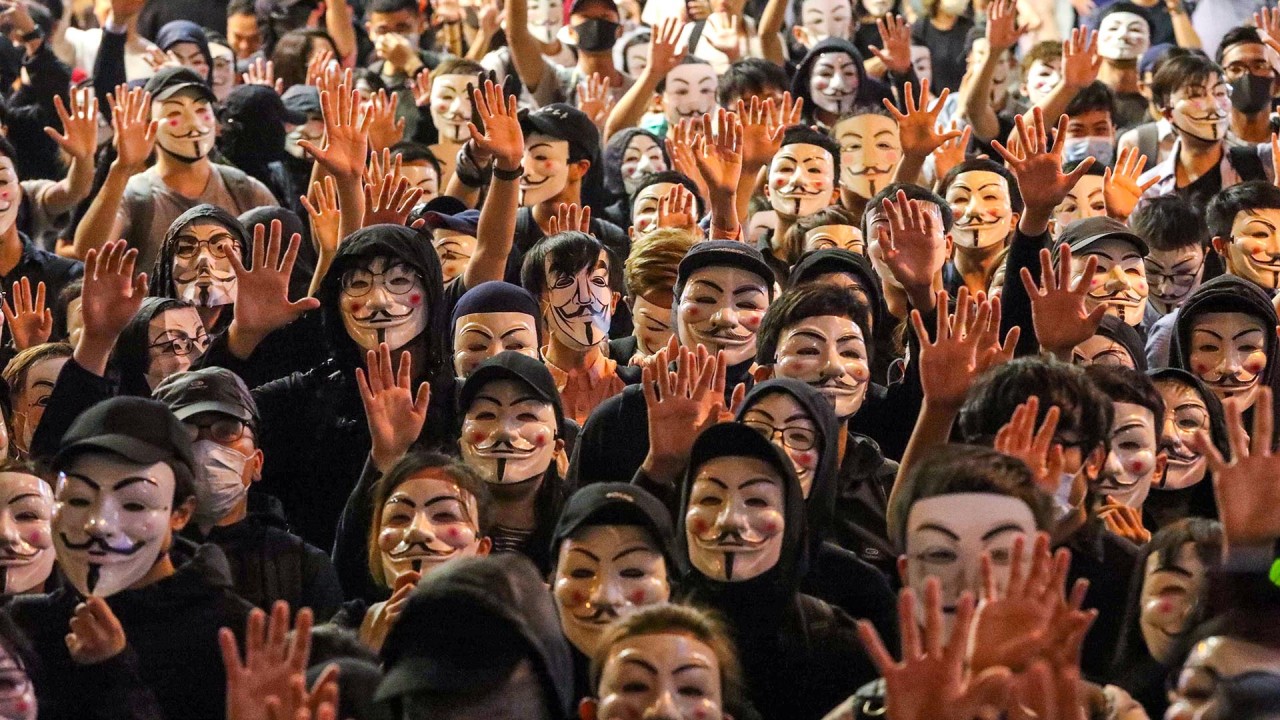
Hong Kong mask ban constitutional for all public meetings and processions, top court rules, backing use of colonial-era law
- Court of Final Appeal sides with government over use of emergency powers
- Mask ban was introduced during height of civil unrest in 2019
Siding with the government, the Court of Final Appeal went even further than a lower court ruling to find the law, previously deemed constitutional only when used at unlawful and unauthorised assemblies, to be applicable to all public meetings and processions.
Shortly after the release of the judgment, Kowloon City Court became the first to convict and sentence a protester for breaching the mask ban on Monday afternoon, sentencing a student to three months in jail for the offence.
The top court also found it was constitutionally sound for the government to invoke the colonial-era Emergency Regulations Ordinance to impose such a ban, on the grounds of public danger.
The five justices ruled unanimously that the ban was appropriate as it was in line with, and no more than, what the government required to deter peaceful protests from turning violent.
“The interests of Hong Kong as a whole should be taken into account since the rule of law itself was being undermined by the actions of masked lawbreakers who, with their identities concealed, were seemingly free to act with impunity,” they said in a 71-page judgment.

03:39
Protesters gather to mark one month since mask ban was introduced
A string of former lawmakers brought the legal challenge, arguing the government’s move to cite the Emergency Regulations Ordinance for the enactment of the ban was an attempt to escape legislative scrutiny, but the court disagreed.
Speaking outside the court, ousted lawmaker and veteran opposition activist “Long Hair” Leung Kwok-hung, one of the litigants, expressed his disappointment.
Claiming the judiciary was “under immense pressure”, he said those safeguards would no longer be meaningful as Beijing further tightening its grip on Hong Kong.
But a government spokesman welcomed the ruling. “When striking a fair balance between the societal and individual interests, the interests of Hong Kong as a whole should be taken into account,” he said.
The situation on the streets and in other public places in Hong Kong had become dire. Members of the public were fearful of going out to certain places
Monday’s decision ends the controversy surrounding the government’s move to quell anti-government protests by invoking the Emergency Regulations Ordinance on October 5 last year to prohibit face coverings at any demonstrations, regardless of whether they were violent or not.
But the move prompted 25 opposition lawmakers, who have since either resigned or been ousted, to file the judicial review to challenge whether it encroached upon civil liberties, as well as the legality of the ordinance allowing the government to bypass the Legislative Council.
On Monday afternoon, Kowloon City Court convicted student Fu Wing-lam, 23, of taking part in an unlawful assembly, wearing a mask while participating, and possessing an instrument fit for an unlawful purpose during an anti-government protest in Hung Hom on October 27 last year.
She was jailed for eight months in total, three of which stemmed from her violation of the mask law.
A police spokesman said 138 people had been prosecuted under the ban. Among them, six had gone to court, with three being found guilty, one bound over and two acquitted.

The five justices – Chief Justice Geoffrey Ma Tao-li, and Justices Joseph Fok, Andrew Cheung Kui-nung, Roberto Ribeiro and Lord Lennie Hoffmann – noted that before June last year, when the wave of anti-government protests began, the city did not have a tradition of demonstrating with people wearing masks. Wearing facial coverings did not “lie at the heart of the right of peaceful assemblies”, they said.
Chief Executive Carrie Lam Cheng Yuet-ngor’s decision to impose the ban came after months of violence and unlawful events, and the court had to strike a balance in the interest of society as a whole, the judgment said.
“The situation on the streets and in other public places in Hong Kong had become dire. Members of the public were fearful of going out to certain places and significant inconvenience was caused to the public at large by blockage of roads and closure of public transport facilities,” it said.
“There is a clear societal benefit in the [Prohibition on Face Covering Regulation],” said the justices, referring to the ban by its legal name, “when weighed against the limited extent of the encroachment on the protested rights in question”.

The former lawmakers argued earlier that the ordinance came with a subjective and potentially arbitrary power for the chief executive to legislate, making it prone to “authoritarian abuse”.
However, the judges dismissed those fears, and said the law was “controlled and restrained” by Legco, the courts and the Basic Law.
During the course of the legal battle, the anti-government protests have subsided as Hong Kong battles the coronavirus pandemic, which has prompted the government to pass legislation forcing people to wear masks.
Pro-establishment lawmaker Elizabeth Quat said the use of masks had allowed violent protesters to evade justice in the past year and the ban was needed as a deterrent.
“The Court of Final Appeal’s ruling has affirmed this point and agreed that even started out as peaceful demonstrations and protests could descend into violence and unlawful disturbances when people were allowed to cover their faces,” Quat said.
Human rights lawyer Albert Ho Chun-yan, who represented the lawmakers, took issue with the top court’s finding that it also banned masks at authorised protests, saying that in real life police could have told people to remove their masks in the event that peaceful demonstrations descended into chaos. But he urged the public not to lose confidence in the court.

